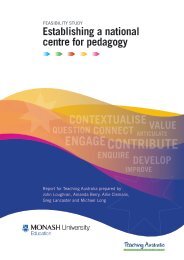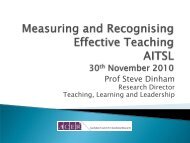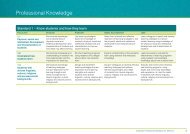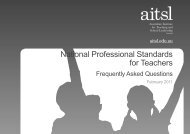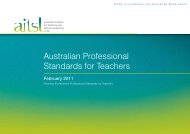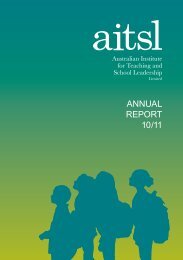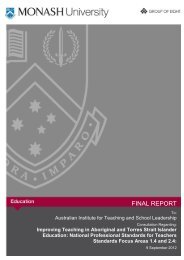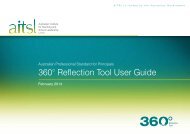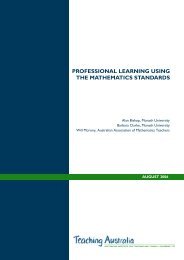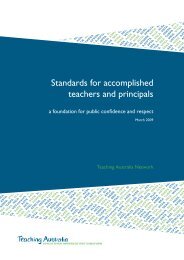Professional Learning Flagship Program: Leading Curriculum Change
Professional Learning Flagship Program: Leading Curriculum Change
Professional Learning Flagship Program: Leading Curriculum Change
You also want an ePaper? Increase the reach of your titles
YUMPU automatically turns print PDFs into web optimized ePapers that Google loves.
<strong>Curriculum</strong> leadership and social justice<strong>Curriculum</strong> change is routinely closely connected to a social and political context. Indeed, curriculumchange itself is most often prompted by policy decisions at the political or administrative level. Thesedecisions establish priorities and challenges, both perennial and periodic, for curriculum leadership.A central concern of educational policy is the obligation to ensure fair educational opportunities andoutcomes for all students — the challenge of social justice.Essential to the moral dimension of educational policy and practice, and especially to curriculumchange, are considerations of social justice (Fitzgerald 2009; Gunter, 2006), and a substantial literatureconfirms the importance of leadership in the creation of socially just educational outcomes.Muijs et al. (2010, p.142) point out that social justice implies a number of leadership tasks beyond thestandard notion of the effective school, including:• Enabling the school to respond to students from diverse backgrounds;• Connecting school culture to students’ home and community cultures;• Promoting the overall personal and social development of students and enhancing their life skillsand life chances, as well as promoting their academic development;• Reconciling the social inclusion agenda with the standards agenda;• Managing complex relationships with communities, community agencies, and employers.Much of the focus of leadership for social justice is on the beliefs and values of leaders and theircolleagues, confirming the general literature on leading change. Brown (2006) notes the particularchallenges in achieving this, which arise from the tendency among some leaders to see their role aslargely technical, a tendency which Jean-Marie, Normore and Brooks (2009) also note, linking it tothe origins of educational leadership in an administrative tradition. Brown (2006) suggests a range ofstrategies for preparing leaders for leadership for social justice, as do McKenzie et al. (2008).Hynds (2010) reports a study of resistance to social justice initiatives from teachers and the community,and the need for leaders to be prepared to deal with resistance. This is not straightforward, as Koseand Lim (2010) demonstrate in their study of the impact of professional learning programs on teachers’beliefs about social justice and education. While results indicated positive changes in beliefs to a morejust orientation, negative results also occurred, leading the authors to recommend a more concertedapproach to professional learning of this kind. Similarly, Lumby (2006) found ambivalence amongleaders in their understandings of and commitment to social justice. These studies identify a clear needfor leadership development in this area.Capper (2006) proposes a framework which relates three dimensions of social justice leadership (criticalconsciousness, knowledge and practical skills) to the three basic elements of the teaching processof curriculum, pedagogy and assessment, and elaborates on the implications of this framework forleadership development. Raffo and Gunter (2008) suggest that different approaches to leadership forsocial justice can be represented as three forms of narrative (instrumental, biographical and critical)which reflect the values, rationales and strategies involved in the approaches.Research has also identified strategies at the school level which promise progress in achieving sociallyjust outcomes. Muijs et al. (2010) identify a range of strategies which schools used to address thesetasks, and their particular implications for leadership. Theoharis (2007, 2010 ), Shields (2010) andNiesche and Keddie (2011) report case studies of schools and leaders which illustrate a range ofstrategies used to develop whole school approaches to socially just schooling, while Ross and Berger(2009) derive from a review of research a range of recommendations for leadership practice.Of special significance in the Australian context is the need for leadership to address the situation ofIndigenous students. While much of value can be drawn from the general leadership research, andstudies on leadership for social justice in particular, there remains a range of considerations of distinctrelevance to Indigenous education, and a significant literature which has addressed them.<strong>Professional</strong> <strong>Learning</strong> <strong>Flagship</strong> <strong>Program</strong>: <strong>Leading</strong> <strong>Curriculum</strong> <strong>Change</strong>: Literature Review 32




